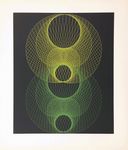In the geometric context of the Twentieth Century Art Collection - Works donated by Florencio Martín and works deposited by ARS Citerior ...
←
→
Page content transcription
If your browser does not render page correctly, please read the page content below
in the geometric context
of the Twentieth Century
Art Collection
Works donated by Florencio Martín and works deposited by
ARS Citerior collection Comunidad Valenciana
Museo de Arte Contemporáneo de AlicantePrevious page: Abel Martín. Musical, 1971. Serigraphy on paper
ARS Citerior collection. Deposit
Eusebio Sempere (Onil, Alicante, 1923-1985) and his partner Abel Martín (Mosquerue-
la, Teruel, 1931-Madrid, 1993) learned the technique of serigraphy (screen-printing) in
Paris. They introduced the technique in Spain upon their return to the country in 1960,
producing beautiful prints of their own works and that of their artist friends, thus disse-
minating abstract art, which was then unknown. Sempere and Abel worked together at
first, but as from the mid-1960s, Abel pursued the technical process alone. In this way,
he became a key figure in the reproduction and circulation of contemporary art in Spain.
They were deeply convinced that graphic work deserved the status of original work, that
contemporary art was within the reach of the general public, and that it could turn into a
mass phenomenon. Such a respect and enthusiasm that both had for graphic work had
repercussions on their own Twentieth Century Art Collection. This remarkable sample
of drawings, engravings, lithographs and serigraphs covers the broad range of essential
artists, taking us on an exciting tour of the past century’s artistic framework. This exhibi-
tion shows art that emerged in concrete contexts, from Parisian kinetic works to Spanish
geometric productions.
Eusebio Sempere’s work, screen-printed by Abel Martín, is renowned. It constitutes a
true display of technique and craft. However, the serigraphs composed by Abel Martín,
as an artist, are little known.
He produced only a few works over a short, four-year period, between 1968 to 1972, of
which some are shown here, a mere twenty works divided into three blocks: Metempsi-
cosis with texts by Tomás Marco; Musical, with texts by Enrique Delgado and six musical
scores; and Redes with a story by Florentino Briones, as well as a series of unrelated
serigraphs. In all of them, the artist uses geometry based on planes or curves, by means of
programming languages closely linked to the Calculus Centre of the University of Madrid.
He participated actively in the Centre’s seminars, thereon regarding the collaborations
with artists as a transversal and enriching creation process.Abel Martín. Musical, 1971.
Serigraphy on paper
ARS Citerior collection. Deposit
Views of the exhibition at MACA, 2021.Art made serigraphy
Abel Martín was an expert in serigraphy. After engaging in various trades, he went to Paris in 1958, in
the steps of his brother Florencio. There, he met a group of young artists including Salvador Victoria,
Lucio Muñoz, Pablo Palazuelo or Eusebio Sempere, with whom he would establish a close, lifelong
friendship and artistic partnership. Together, they learned the screen-printing technique at the ate-
lier of Wifredo Arcay, the Cuban artist. This skill-building process would be “slow and full of secret
tricks”. At the same time, they printed works by artists of the Denise René Gallery: Jean Arp, Augus-
te Herbin, André Bloc or Victor Vasarely.
Abel Martín
Musical, 1971. Serigraphy on paper
ARS Citerior collection. Deposit
In Madrid, they both set up a workshop to print Spain’s first artistic serigraphs including a complex
book by Lucio Muñoz that included sand textures. The perfection of this book attracted commis-
sions from other artists, especially those who gathered around the Museum of Abstract Art of Cuen-
ca: Antonio Saura, Fernando Zóbel, José Guerrero, Manuel Millares , Hernández Mompó, Gustavo
Torner or Gerardo Rueda. Abel became a reference in serigraphy, creating beautiful prints and books
of a remarkable quality, that were produced at first in the Cuenca workshops and later in his Madrid
atelier. There are many serigraphs that we know he printed, although we do not know the exact
number or how many artists he worked for. We have deepened our knowledge thanks to Florencio
Martín’s generous donations and the works in the ARS Citerior collection.You can also read



























































